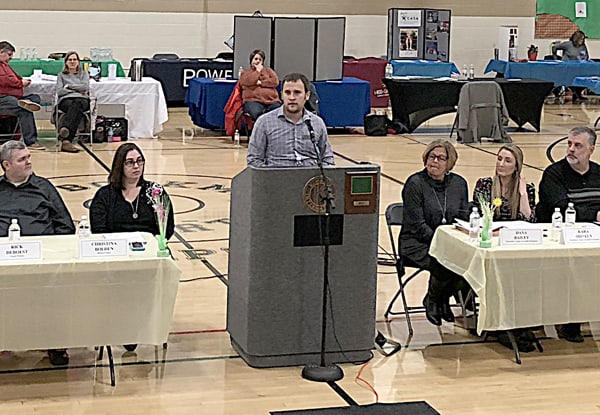Emotions ran high at the second in a series of town-hall style meetings titled “Opioid Crisis: A Community Call To Action” held at the North Webster Community Center Thursday night.
Panelists speaking on the effects of drug addiction on families gave passionate pleas for community involvement and testified about personal experiences.
Andy Bautz, director of Turning Point Counseling Center in North Webster, spoke of parental responsibility to constantly send a message to their kids regarding drug use.
“I tell parents all the time, ‘you’re responsible for what you say to your kids and what you teach them. And in some ways, you’re responsible for what you don’t teach them, or what you don’t say,’”Bautz said.
“We live in a politically-charged climate now, where kids are speaking up a little bit louder than they used to. Sometimes that’s a good thing, but sometimes kids are going to need to take a more firm stance.
“In a community assessment a few years ago, one of the things we found out was parental attitudes toward drugs and alcohol and law enforcement were fairly negative. This means parents weren’t really enforcing things like the simple reality that marijuana is illegal, underage drinking is illegal. And since parents weren’t enforcing that with their children, the children were just running with it.”
Lindsey Castro, of the Department of Child Services, provided statistics regarding children being separated from parents abusing drugs in Kosciusko County. She said the department is currently serving 141 children involving over 82 cases, with 57 of those cases stemming from drug addiction and 21 involve drug-addicted babies.
Castro said DCS needs more relatives of addicted people, as well as the general public, to step up and serve as foster parents.
Jamie and Rick DeBoest have been foster parents for about 31⁄2 years. Jamie said while the process has its rewards, “this work is messy, and they destroy a lot, but foster care is a part of what comes along behind to help. But when it really hurts, it can be heartbreaking.”
She talked about how hard it is on kids when they have appointments to see their parents, and the parents don’t show up.
“You get a lot of different experiences,” Jamie said. “You have some parents who are ready to jump on board and do whatever they have to do, and some are all talk and no walk. Unfortunately, they make a lot of promises to their kiddos, and you’re the one that has to tell them ‘momma didn’t show again.’ Then you go home with that heartbroken tantrum.
“Part of the heartbreak is you see that these parents do love their kids to the best of their ability, but often these parents are just kids in big bodies, and they’re trying to get their needs met because theirs weren’t met, and they also have this drug addiction.
“It’s easy to say they love their drugs more, but that’s not true. But their actions say that. They’re so desperate for thier next fix that they’re severly neglecting their children, even after (the kids) are in placement with us.
“The effect we see is parents who are heartbroken enough to cry when you walk out of the office after a visit, but not enough to go get help or to show up for all the visits.”
The DeBoests encouraged the audience to consider becoming foster parents. “It’s messy, but it’s worthwhile,” Jamie said.
The Bowen Center’s Christina Bolden said she’s had clients who have to deal with the hurt in their past as part of their recovery.
“I can’t tell you the horrors I’ve seen in my office,” she said. “My concerns for our youth right now are that our culture has created opiates or other drugs to be a right, and that they don’t have any responsibilities right now.
“What they fail to understand is going out partying with your friends tonight leads, often very quickly, into regular drug use.
“Nobody sets out to be an addict; it’s something that just happens over time, often very quickly and without their knowledge. All of a sudden they wake up and realize they’re using every day, and they wonder how that happened.”
Bolden said the road to sobriety isn’t an easy one, and addicts need less judgement and more understanding and caring.
Dana Bailey and Kara Shively, of the county’s juvenile probation office, spoke. Shively said the most common crimes for juveniles entering the justice system is the theft of property, and second was for crimes related to the use and sale of controlled substances.
Bailey called for people to step up as mentors.
“I would love to have a kid say they were interested in, say, cosmetology, and to be able to call a cosmetologist and say ‘hey, can you come out and talk to this person.’ We need those kinds of mentors to get kids excited about something.”
Bailey related a recent story about a girl with addicted parents who are divorced.
“She’s basically been living on her own since she was 15. That girl is now 17 and has a 1-year-old son. That son tested positive for meth and marijuana and has been placed with relatives.
“This girl came in today, and all she wants is to see her son. She hasn’t seen him for a month. It breaks my heart; she wants her family, she wants to have involvement, she wants to get better, but there’s a lot of denial involved as well.”
One of the more powerful stories of the evening came from Courtney Jenkins. Her son, Caleb, is currently in rehabilitation in Florida.
“The times I slept best were the times I knew he was in jail, because I knew where he was and that he would be safe,” she said. “It was hard to call the cops on my own son, but we just didn’t know what else to do.”
Ken Locke, representing the Greater Warsaw Ministerial Association, spoke on the issues his extended family has faced and the lack of preparedness he felt. He provided a list of faith-based organizations in the area offering drug counseling.
Recovering addict Shasta Ashpole shared a portion of her story. She talked about well-intentioned family members enabling an addict’s behavior.
“It’s possible to love an addict to death,” she said. “It may sound a little harsh, but it’s the truth.”
Mary Gerard, Bowen Center Vice President of Human Resources, concluded the meeting with a call to action. Audience members were given a list of 50 things they can do to ease the drug addiction issues in the county.
“Everybody can do at least one thing on this list,” she said. “Some of you can do 49 or even all 50 things on the list, but everybody can do something.” The list will be posted at www.abridgetohope.org.
Ron Ousley, director of A Bridge To Hope in Warsaw, said the third meeting in the six-part series would focus on drugs on the streets. A specific date in May and venue have yet to be determined.





